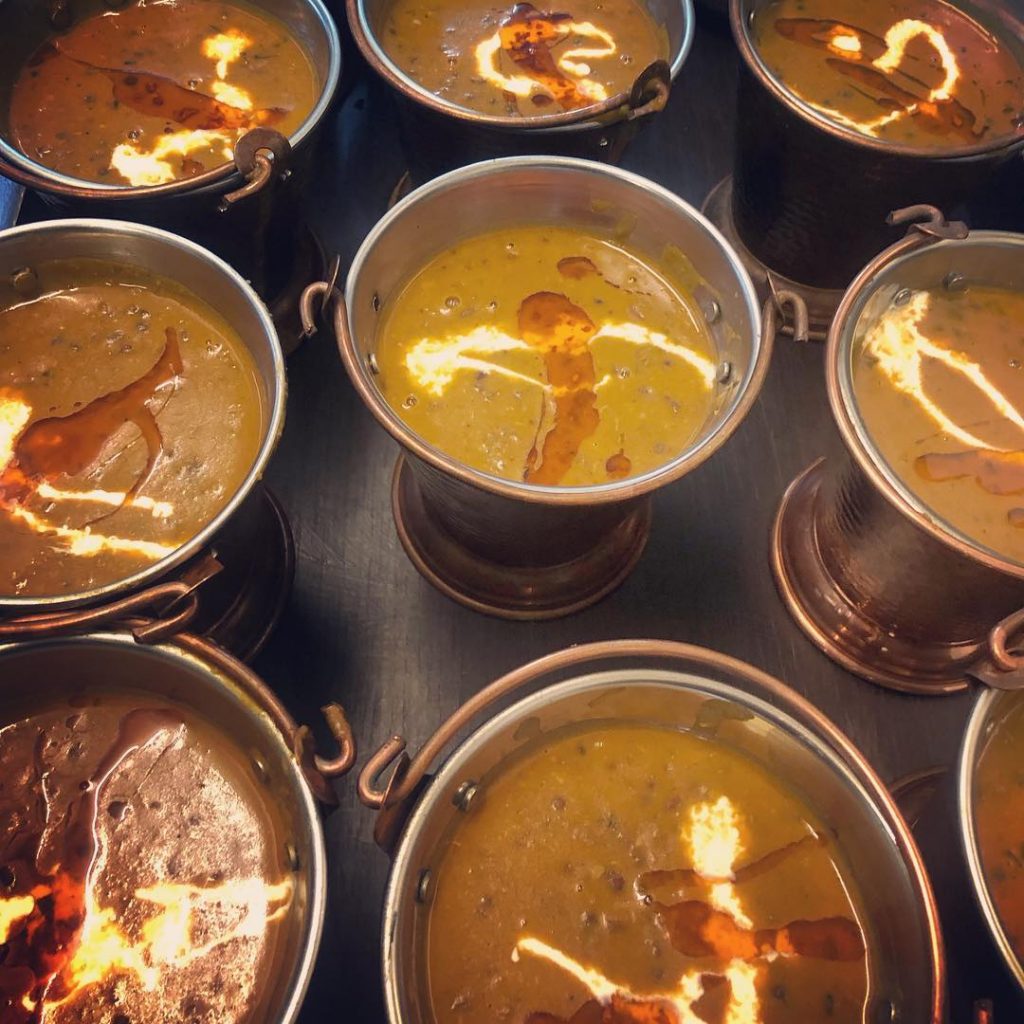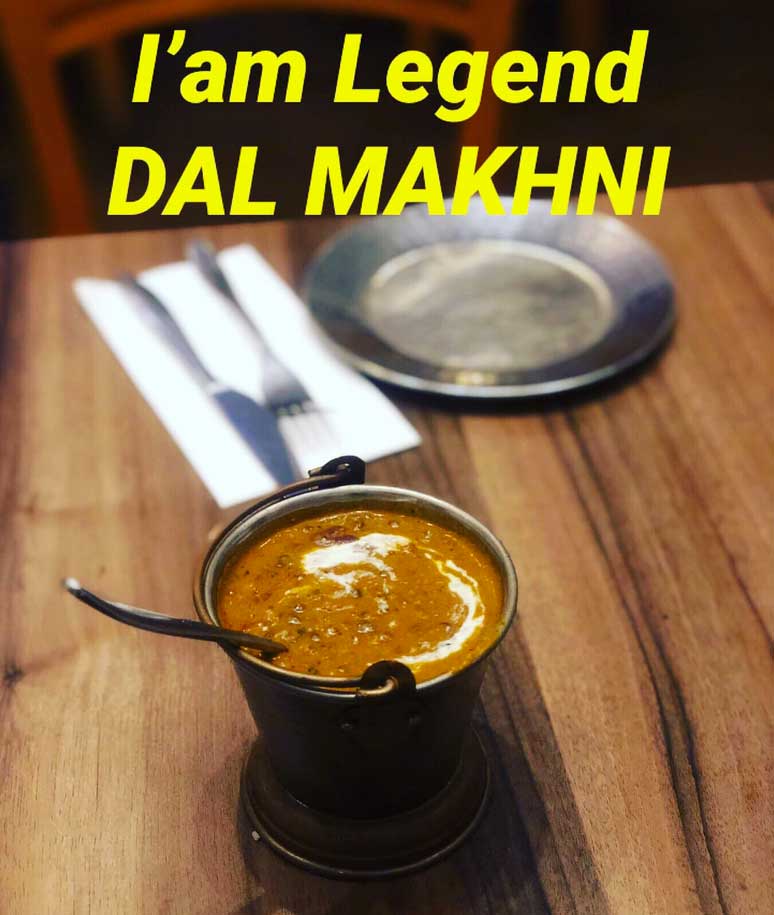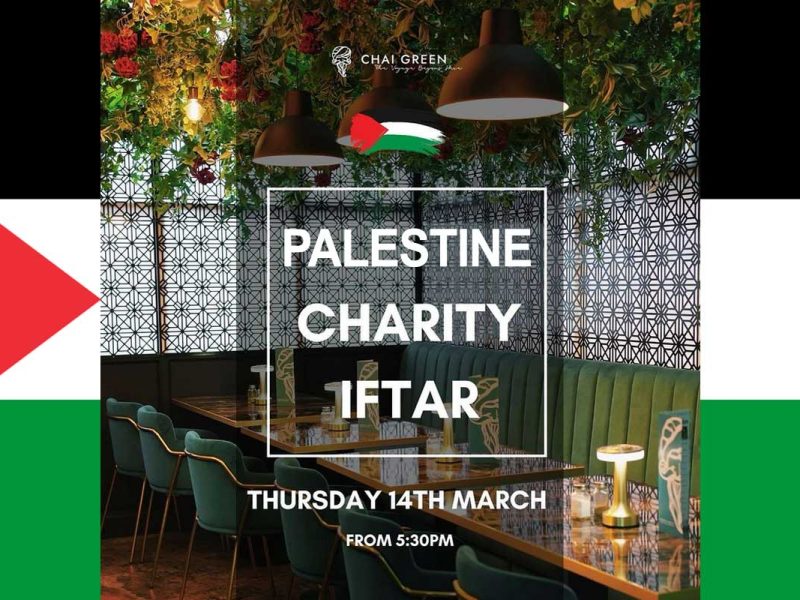Rangrez owners accused of Islamophobia over Dal Makhani
I dare any Pakistani or Bangladeshi chef to cook Authentic Dal Makhani not Dol Mokhani – Chef Harman, owner of Ealing restaurant Rangrez
An Indian chef has apparently unearthed a fool proof way of distinguishing a genuine North Indian restaurant from a phony Bangladeshi-run copycat.
Chef Harman Singh Kapoor believes that the mere inclusion of a black lentil dish called Dal Makhani on a menu proves the authenticity of a North Indian restaurant.
The owner of London curry house Rangrez made a number of claims in a video posted on his Facebook account last week titled ‘How to distinguish between north Indian and Bangladeshi Restaurant [sic].’
During the course of the minute long rant, Harman also asserted that Pakistani and Bangladeshi chefs are incapable of cooking this dish.
But the video was met with controversy as users began accusing the chef of being unprofessional by bringing religion into the argument.
Assuring his listeners that he is only attempting to raise awareness, Harman alleges that most restaurants considered to be Indian are run by Bangladeshi owners.
“One very simple thing [on] how to differentiate: ask them to give you a menu. On the menu, check [for] Dal Makhani. If you don’t find Dal Makhani, that means [that] that restaurant is not Indian, because other chefs from Bangladesh and Pakistan, they don’t know how to cook this dal [sic],” he says.
Facebook members respond to Chef Harman’s controversial views
I told that Pakistani chefs can’t cook authentic Dal Makhani. And it’s true – Chef Harman
Although the first response to his video was light-hearted: “Those Bangladeshis, coming over, taking all our daal makhani. How dare they put the daal in a pot and cook it over night with some cream,” Harman has since come under heavy criticism.
Following a series of heated exchanges with other Facebook users, the chef’s alleged confrontational approach is brought into question: “Sadly this chef seems to comment in quite a divisive manner rather than informative one. And some of his responses seem to show an underlying issue with Pakistanis and Bangladeshis in the restaurant trade. Let’s hope this is not the case.”
But a determined Harman declared: “I told that Pakistani chefs can’t cook authentic Dal Makhani. And it’s true [sic],” before repeating his challenge: “I dare any Pakistani or Bangladeshi chef to cook Authentic Dal Makhani not Dol Mokhani; it’s about authentic food not about copying from YouTube [sic].”
Harman then posted the following response which immediately drew the ire of several people who accused him of religious discrimination: “Sorry, I don’t serve Halal food. So u can’t eat at my restaurant.”
The individual in question responded by asking: “Are you discriminating against Muslims? Are we not welcome to your restaurant because you don’t serve halal?” before another declared such speech as “proper Islamophobia racist speech”.
One member even tried to offer some advice: “Online presence is a dangerous thing, be sure to think before you speak, give thought before you record. One awkward move and you could be perceived as a racist.”
But Harman’s co-director and wife, Khushi Harman Kapoor, was quick to come to her husband’s defence by clarifying: “Any paying customers is welcomed. And people from other communities come here to eat lamb because they say it’s best. U r also welcome [sic].”
Despite this proviso, Khushi did later tell one person to “stay where u r as Rangez don’t serve Halal food for you guys [sic]”.
Although Chef Harman said he could not comment on his wife’s posts, he did tell FtLion: “I was not [being Islamophobic]. It was my moral duty to tell people that we don’t sell Halal.
“I have Muslims friends who come to my restaurant and they eat dal and vegetarian dishes, and they are most welcome to.”
In an apparent u-turn, Harman made clear that he did not mean that a Pakistani or Bangladeshi chef was entirely incapable of cooking this dish as well as a North Indian chef.
“I am not here to fight anyone,” he said, adding: “All I am saying is that I have not seen a Pakistani or Bangladeshi restaurant cook good, authentic Dal Makhani. That is all I wanted to say, but people started attacking me about this and that.”
Objections were also raised against attributing this dish to North India with some suggesting that it had its beginnings before the actual partition and the independence of India in 1947.
Whereas one member simply remarked: “Copywriting the Daal Makhani!? It was all one country to start with,” another reminded Harman: “And do not forget that all of these countries were once the same, so cool it on the nationalism.”
While a third argued: “Totally disagree because guess what… Pakistan and Bangladesh were part of indian not so long ago. Everyone ate the same and everyone cooked the same.
“People came to the uk with those ancient reciepes. Bangladeshi and Pakistani still have the right to be call their resturants ‘Indian’ with or with[out] ‘daal Makhni’ [sic].”
Does Dal Makhani originate from North India?

“Bucket full of Dal Makhani!! Creamy,buttered black lentils slowly cooked for hours to enhance” – Rangrez
As to whether Chef Harman has an argument for the Dal Makhani originating from a post-partition India, then the answer appears to depend on how far back one might be willing to go.
Is the Dal Makhani as Harman understands it an entirely novel creation exclusively conceived and executed in India with no outside influence?
According to renowned Indian journalist and food critic Vir Sanghvi, who published a piece titled The Modern Dal Makhani was Invented by Moti Mahal, the clue lies in the type of lentil used.
Given that Dal Makhani is made from urad, or black gram lentil, the people who are said to have focused on using whole urad and not broken, were Punjabis from a particular pre-partition region of the subcontinent.
Sanghvi reveals: “This was the specialty of Punjabis in Peshawar. Dhabas (there were relatively few restaurants in those days) sold a black dal made with whole urad and served with a few rotis.
“When the Peshawaris came over after the Partition, they brought this dal with them. As many Peshawari Punjabis became restaurateurs, this was the dal they put on their menus.”
Another columnist who appeared to echo Sanghvi’s account while writing on The Story of Dal Makhani was Lily Swarn.
“The original Dal Makhani, which was made in the Western part of Punjab, which is now in Pakistan, was made by the Peshawaris. The Punjabis sold this dal with a few flat unleavened bread called roti in Peshawar dhabas.
“When the Peshawaris came across the border after partition they brought this dal with them. It was made with whole urad dal and it simmered in a clay pot or handi for long stretches of time.”
Tracing the antiquity of this Punjabi dish, she also distinguished this version from its eastern counterpart stating: “The other version of this dal which was more popular in East Punjab and Lahore has few red kidney beans, Rajmah and some split gram pulses known as chana dal. The addition of these two adds a certain viscosity and thickness to the dish. It is definitely clear that the pre-partition recipe did not use any tomatoes in their Ma ki Dal.”
Both authors therefore recognise a distinction between an “original”, “pre-partition” Dal Makhani, with its roots firmly set in what is now Pakistan, and what Sanghvi dubbed the “latter day” or “modern Dal Makhani” which at some stage incorporated the use of tomatoes.
Sanghvi then asks a pertinent question: “Why is it then, that tomato puree is now regarded as an essential ingredient of black dal?”
And this is where Chef Harman’s perspective of a North Indian Dal Makhani, albeit a modernised version, comes into the equation.
The story goes, continues Sanghvi, that a one Kundan Lal Gujral “had come over after Partition” and opened what is now the famous Indian brand, Moti Mahal.
According to his grandson, Monish Gujral, “[a]ll Kundan Lal did was to take the black dal of his ancestors and to add his makhani sauce to” create the “latter day dal makhani”.
So is Chef Harman’s Dal Makhani North Indian and can it be used as a litmus test for determining the authenticity of restaurants claiming to serve cuisine from said region?
And are Bangladeshi and Pakistani chefs incapable of cooking what is ostensibly a time consuming, yet seemingly straightforward dish?
Answers to these questions may essentially come down to ideas of inclusivity, open-mindedness, and the possibility that food may… just… by its very nature… transcend borders, cultures and, dare one utter, religions.






Imtiaz
/
I’m Bangladeshi classically trained in regional Indian cuisines. I want to have a cook off with Bhaji here lol.
9 Dec '20Khalid
/
I would like to see this. Can you make it happen. Livestream it on youtube?
10 Dec '20FtL / Author
/
So would we!
10 Dec '20Imtiaz; if you’re serious, drop us an email or message us through social and let’s get this resolved once and for all :)
????? ??
/
I don’t know why you choose to profit off some controversy from a single ignorant sikh chef. Let’s have some more empathy and understanding for our fellow man in why they’ve come to such conclusions. I’d ask the writer of this article to write quality articles about good halal food not tabloid level drama looking to target someone who doesn’t look like us. Let’s not become what we get targeted by all the time.
10 Dec '20